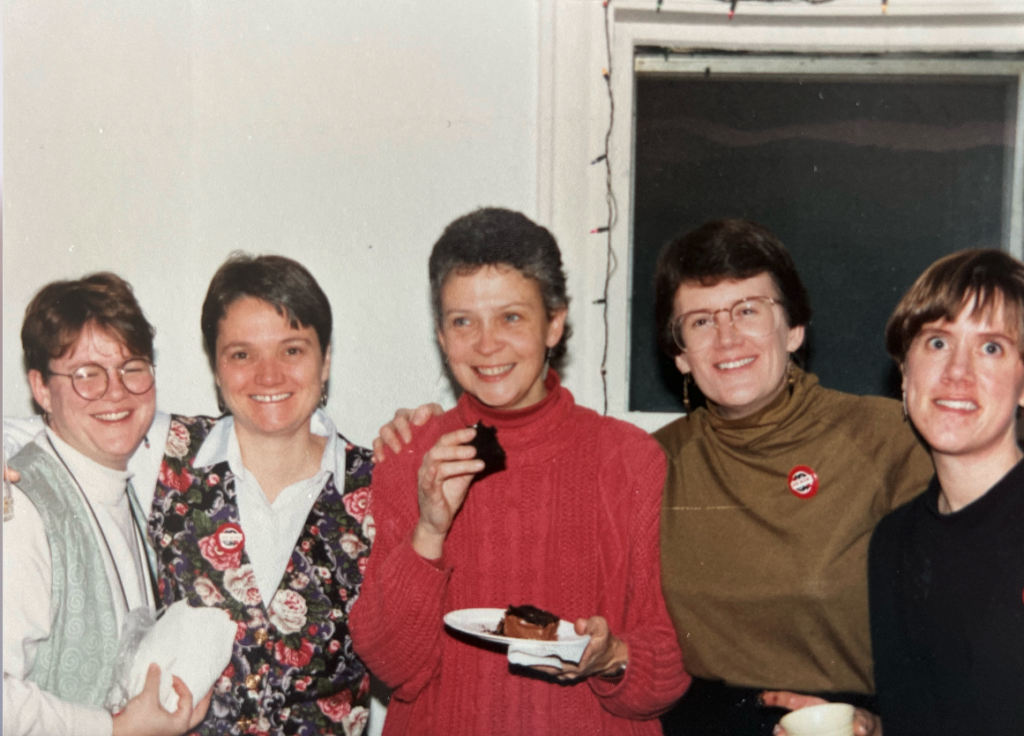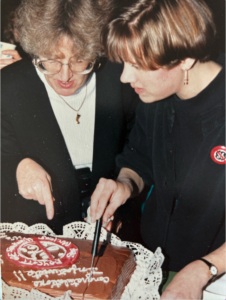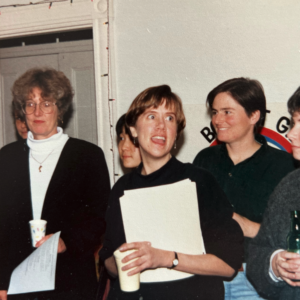“Listen and truly hear what others are saying.”
“Plan strategically.”
“Take action (not by the seat of your pants).”
“And keep the issue you are fighting for more serious than yourself!”
This is the credo INFACT’s (now Corporate Accountability) Nuclear Weaponmakers Campaign National Director Ruth Shy uses to describe Kirsten Cross’s legacy for current and future organizers. Earlier this year, Kirsten, a long-time organizational leader and friend to generations of staff and volunteers, passed after a bout with pancreatic cancer.
As Ruth, who trained Kirsten for her first job with Corporate Accountability, and so many others have noted in tribute, Kirsten was the embodiment of what it means to be an organizer. Kirsten preferred not to be in the limelight, but rather the vessel for the greater cause.
“When training staff and volunteers, she was clear the trainings were based on a method born of the collective wisdom of those who came before, always humble about her own creative contributions,” says Paul Milne, Corporate Accountability’s long-time advisor on strategy.
And Kirsten was taken with Corporate Accountability’s history and organizing, which owed greatly to antecedents like the United Farm Workers. She wrote her senior thesis in 1988, when she was a student at the University of California at Santa Cruz, on the organization’s boycott of General Electric (GE). The boycott set out to end the corporation’s production and promotion of nuclear weapons and reduce the threat of nuclear war.
“INFACT’s organizing methods have become more refined and sophisticated. Their new campaign may take a longer time than the Nestlé boycott, but I believe they will be successful,” Kirsten wrote presciently. Months later she was directing the campaign in Northern California.
Ruth quickly identified Kirsten’s promise to run a campaign center, building partnerships with labor and religious institutions, developing an expansive and active volunteer base, as well as hiring, training, and managing new staff.
One of those staff was Kathy Mulvey. Kathy recalls the organization she was hired into. Long, intensive days. Hours on busy sidewalks recruiting volunteers, generating signatures, and raising money, an ironing board as your makeshift table for petitions and campaign literature. Phonebanking for four hours a night to build the people power and resources needed to stem the threat of nuclear holocaust by pushing the most powerful corporation in the U.S. out of the nuclear weapons business.
The immediate and existential pressures were, needless to say, incredibly weighty. But Kirsten set up a framework that animated success.
“When you’re taking on huge systemic problems on long timeframes, we know that has to be broken down into bite-sized pieces and steps that people can take that are doable on a much shorter horizon…where people can see the connection to that longer-term goal,” says Kathy. “Kirsten was so dedicated and diligent in doing that.”
But Kirsten’s attention to each individual, the human beings behind the campaigning, is what perhaps set her most apart, according to Kathy.
“We would go back to Kirsten’s group house at lunch and eat veggie burgers and get to know each other. And we’d laugh. What an impish sense of humor she had!” says Kathy. “That was really grounding at the time.”
Kathy would go on to become executive director and lead the organization’s pioneering work to advance policies holding corporations accountable across borders.
“Kirsten taught and modeled so much of what I still strive to do today,” says Kathy.
In the early 1990s, Kirsten, Kathy, and staff from across the country moved to Boston as the campaign established a central office from which to conduct the final phase of the Nuclear Weaponmakers’ campaign.
In March of 1992, the film INFACT partnered with filmmaker Debra Chasnoff to produce, Deadly Deception, won an Academy Award, exposing the toxic and radioactive legacy of GE’s nuclear weapons production and propelling INFACT’s GE Boycott campaign onto an international stage.
At the same time, however, it was proving increasingly challenging to maintain campaign momentum after the end of the Cold War. The public was under the mistaken impression that the threats to public health and global security that nuclear weapons presented had passed.
Undeterred, Kirsten and team would get highly creative with limited resources, in one of the more impressive displays of organizing in the history of corporate campaigning.
PBS, nationally, was willing to accept underwriting from GE, but refused to run Deadly Deception. So Kirsten and team went station by station to get the documentary aired.
At the same time, Kirsten and INFACT’s skeleton team partnered with faith-based and public health organizations to hit GE in the pocketbook, diverting sales of GE medical equipment. When such organizing didn’t yield the results needed, Kirsten was involved in campaign escalations such as securing the endorsement of the United Methodist Church for the boycott.
This, and other aligned organizing, compelled GE to announce the end of its nuclear weapons business the Friday after Thanksgiving in the same year. At a victory party in Kathy’s Boston home, Kirsten gave a victory speech to a staff and volunteer team that had put everything on the line.

Kirsten had the ability to break down ambitious goals into smaller, bite-sized pieces that connected to the long-term success of the campaign. Pictured (from left): President Emeritus Kelle Louaillier, former Executive Director Elaine Lamy, volunteer Judy Whipple, former staff member Chris Hannibal, and Kirsten Cross.
After the Boycott, Kirsten was in demand, ultimately signing-on with a scrappy California ballot campaign to build political will and public support for single payer healthcare, a type of universal healthcare in which the costs of essential healthcare for all residents are covered by a single public system. The campaign was very much ahead of its time.
“Hillary Clinton was leading-up a group representing different parts of the medical industrial complex…they were talking about revamping the health care system,” says Martha Kowalick, the ballot campaign’s director and a former Corporate Accountability board member. “We really thought that single payer wasn’t a part of the discourse, but that we could throw it up on stage and make it a central part of the conversation.”
Martha was directing the ballot campaign for the state, so she needed someone to train and support the organizers in the field. Kirsten came to mind, given her prior work with INFACT. And Martha needed someone who could deliver results fast. Election day was in under a year.
In just a few months, the campaign staff tripled. It established three main offices across the state. It raised more than $1 million. An impressive volunteer base was built. More than a million signatures were gathered. And by November, it had hosted around 1200 house parties to build support.
Much of this owed to Kirsten and, in particular, her management style.
“She had high expectations with a thoughtful touch,” says Martha. “If a person wasn’t getting the results that they should, she would find out what the challenges were and whether the person could overcome them or not. That type of clarity was helpful in determining whether people should step away or step further in.”
And in this, she cared deeply about her staff’s well-being.
“I’d ask her how things were going overall. She could articulate how staff were doing in brief and then we’d go deeper. She could always go deeper!” says Martha. “She’d have the total rundown on how her staff were doing physically and psychologically. She really internalized the values of giving people the tools to be successful. She didn’t feel like people should be doing something they didn’t have good training for.”
And for Martha, so much of her fondness of Kirsten also came from her sense of humor.
“She had the ability to see the humor in situations,” says Martha. “In a hectic, driven way in which we work during campaigns, it was really essential to have that in a partner.”
Kirsten would follow-up her work on Prop 86 working for labor unions and as the co-executive director of the East Bay Alliance for a Sustainable Economy, before returning to Corporate Accountability in 2005 as its staff recruitment and training director.
Corporate Accountability was at the outset of an ambitious growth plan that would see it expand from one campaign to four, around a dozen staff to more than 50.
“She had exactly the skill set we needed for recruiting and training organizers,” said Kathy Mulvey, executive director at the time. “Bringing her back also meant re-grounding all of us in the basic principles of organizing, having a strong voice in our leadership to advocate building power at the grassroots.”
Patti Lynn, Corporate Accountability’s current executive director, who was campaigns director at the time, remembers the stories around Kirsten before she rejoined the team.
“I had these images, a sense of INFACT’s organizing during the GE Boycott and how intensely grassroots it was. People in the street with ironing boards, bringing on folks who shaped local campaign plans as volunteers,” says Patti. “And to this day I have a strong association of Kirsten with that work and of her deep commitment to it.”

Kirsten with activist and former board member Chartis Tebbetts celebrating GE’s announcement to end its nuclear weapons business. This victory came after years of mobilizing people to take action.
From 2005 to 2015 Kirsten helped moor the organization in its traditions, while helping it find new wings.
“I remember having conversations with her about staff candidates and their backgrounds, where she’d really light up around people who had organized,” says Patti. “She felt strongly that we should be dedicated to the fundamentals of helping people connect to their own agency and power.”
Patti also recalls how she went about her work with such uncommon discipline and intention.
“Kirsten had what she jokingly called ‘a meeting with herself’ every morning,” Patti recounts. “She’d take the time to gather herself up and have a mindfulness moment about how she was spending her time that day.”
Others recalled her detailed agendas and fervent note-taking during one-on-one meetings. Kirsten felt she owed it not only to her colleagues and volunteers to always be prepared and present, but to the change she hoped to enable in the world.
“Kirsten was the consummate organizer. If she were on vacation, she’d want to know the goals and objectives,” says Janine Hamner, who after serving on staff went on to join Corporate Accountability as a donor and board member.
“I remember, it was Kirsten’s birthday. She’d been going through a hard time, so I took her on a vacation to Mexico. We’re on a beach, the people around us are sipping Mai Tais, reading People Magazine, and talking about Brad Pitt. Kirsten, non-alcoholic beverage in hand, is intent on having a conversation about racism in America. She was a very serious person who thought very consciously about the things that matter.”
Perhaps most defining of Kirsten’s qualities was her approach to community building.
“Kirsten was a lifelong learner…always finding ways to engage, learn from, and support those she admired,” says Martha Kowalick, who visited Kirsten every week during her final months. “She was contemplative, thoughtful, asked questions. This was her process: look at the angles, discuss them, mull them, resolve a course. She wasn’t any better or smarter than anyone else. She had skills and tools that she was most gracious about imparting, but she also asked for advice.”
A month before her passing Kirsten texted Corporate Accountability President Emeritus Kelle Louaillier, with whom she’d worked since 1989: “We built a good organization that is making a positive difference in the world. I believe we all did this together and that we can feel proud of what we did.”
And to be certain, the Corporate Accountability family is so much taller and prouder thanks to Kirsten Cross walking amongst us and shaping the paths we now pursue.
We will miss you, Kirsten. As Ruth Shy puts it, “Rest in peace…the kind of peace we organized for, working with INFACT to stop further production of nuclear weapons.”
Photos courtesy of Kathy Mulvey



